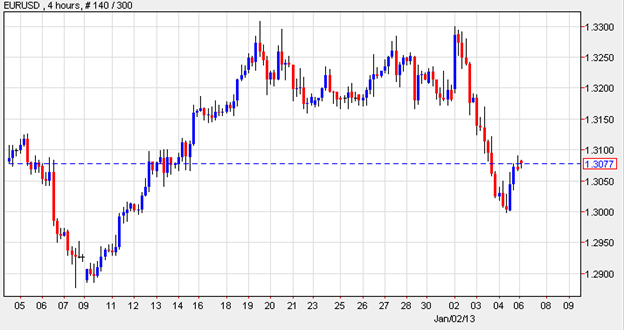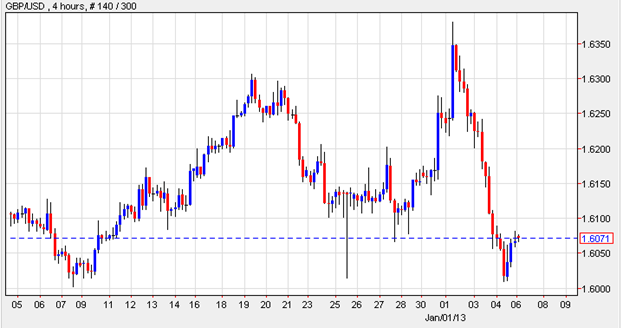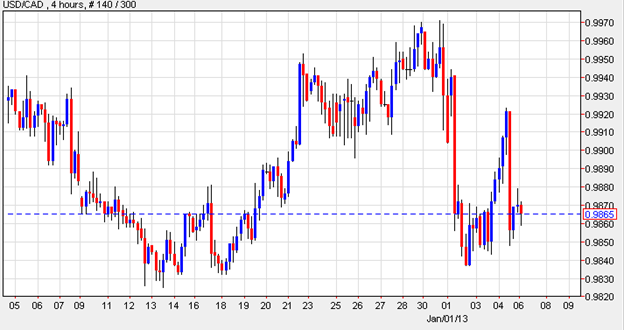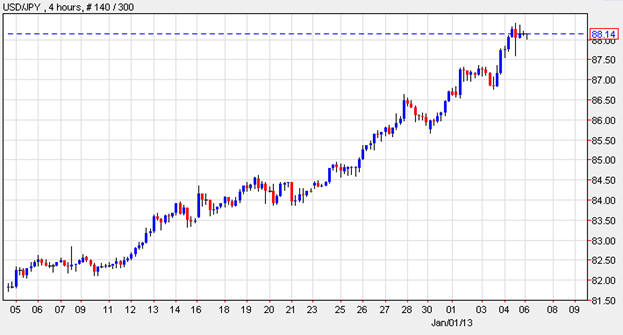The U.S. dollar rallied against the euro during the first week of 2013 after the Federal Reserve issued the minutes from the most recent monetary policy meeting. The minutes revealed that bank officials agreed to put an end to the asset-purchasing program by the middle of this year. The greenback remained strong as risk appetite ebbed on speculation U.S. lawmakers won’t be able to reach an agreement regarding the debt ceiling issue. However, the greenback pared gains as Friday’s economic releases showed that Unemployment posted at 7.8 percent in December, which was higher than anticipated. In the days to come, investors are likely to remain focused on U.S. fiscal talks.
Meanwhile, Canada’s dollar rose the most in close to five months against its U.S. counterpart as data confirmed that employers added almost two times the number of workers predicted in the last month. This supported the government’s opinion that business investments will contribute to economic growth. The loonie advanced against the remainder of its peers on indications that Unemployment dropped to a four-year low while hiring went up for the fifth consecutive month.
The euro pared losses at the end of last week versus the greenback after reports suggested that recovery in the U.S. employment sector may be slowing down. The euro advanced slightly as the figures indicated that employers only added 155,000 workers last month and as Italian and Spanish notes were sold at the lowest yields since September on signs that the global economy is improving.
The British pound weakened against the U.S. dollar following surprisingly disappointing U.K. Services sector data, which boosted concerns the country’s economy may have dipped back into a recession at the end of 2012. The sterling erased some of its earlier losses after the U.S. reported a higher than expected Unemployment level in December. The greenback traded lower against the Swiss franc subsequent to the disappointing labor news. In the week ahead, the Swiss National Bank will issue a report relating to the country’s currency reserves.
The yen slipped for the eighth consecutive week, sustaining the longest period of losses in 24 years, as the country’s Prime Minister, Shinzo Abe, reiterated the importance of devaluating the yen and raising the inflation target.
And lastly, in the South Pacific, the Australian and New Zealand dollars climbed after the U.S. currency came under pressure following the announcement of less than stellar employment figures which increased speculation the Federal Reserve won’t be putting an end to quantitative easing in the middle of 2013. The Aussie dollar had dipped earlier last week versus the greenback after the Service Industry Indexes of the South Pacific nation and China showed declines.
EUR/USD- Yields Decline The Most
The euro pared losses against the U.S. dollar as the greenback came under pressure subsequent to the release of rather disappointing Unemployment figures which suggested that recovery in the country’s employment sector is losing momentum. Meanwhile, Italy and Spain auctioned two-year notes at the lowest borrowing costs since September, suggesting the global economies are rebounding.
On the data front, Italy’s Service Industries rose from 44.6 to 45.6 last month. In the coming days, investors will look forward to announcements by the European central Bank regarding monetary policy. Speculators anticipate the bank will maintain the current interest rate of 0.75 percent. EUR/USD" title="EUR/USD" width="624" height="330">
EUR/USD" title="EUR/USD" width="624" height="330">
GBP/USD- Services Post Surprising Data
The British pound declined against the U.S. dollar after a report indicated that the U.K.’s Purchasing Manager’s Index posted at 48.9 last month, the lowest since April of 2009. This raised concerns that the U.K. has dipped back into a recession in the latter part of 2012. Markit U.K. commented that the data from last week, together with that of the previous week on Manufacturing and Construction suggests the country’s economy has shrunk by 0.2 percent.
Following the surprisingly negative news, Citi Bank indicated that the U.K. may lose its AAA credit rating. Other releases confirmed that Mortgage Approvals rose to 54,036 in November. The sterling erased some of its losses as risk aversion increased in the market after the U.S. reported that Unemployment posted at 7.8% and as nonfarm payrolls pointed to the fact that recovery in the American Employment sector may be moderating. GBP/USD" title="GBP/USD" width="623" height="328">
GBP/USD" title="GBP/USD" width="623" height="328">
USD/CAD- Unemployment Declines
Canada’s dollar rose the most in close to five months versus its U.S. counterpart as Statistics Canada announced that the country’s economy added 39,000 jobs last month, more than the anticipated 5,000. Furthermore, the Unemployment rate fell from 7.2 to 7.1 percent, the lowest in four years. The loonie remained supported as crude oil, the nation’s biggest export rose 2.6 percent and traded at $93.13 a barrel on the New York Mercantile Exchange. USD/CAD" title="USD/CAD" width="624" height="330">
USD/CAD" title="USD/CAD" width="624" height="330">
USD/JPY- Yen Sustains Longest Losing Streak
The yen plunged to the lowest price against the greenback since July of 2010, sustaining the longest losing streak in close to 24 years, as market investors shied away from the Japanese currency on speculations the country’s central bank will opt for more aggressive monetary easing. The U.S. dollar pared a few gains versus the yen subsequent to the release of nonfarm payrolls which showed that the recovery of the labor market may be slowing down. USD/JPY" title="USD/JPY" width="623" height="335">
USD/JPY" title="USD/JPY" width="623" height="335">
Today’s Outlook
Today’s economic calendar shows that the Euro region will report on PPI. Canada will release data on the Ivey PMI. And Australia will issue the Trade Balance.
- English (UK)
- English (India)
- English (Canada)
- English (Australia)
- English (South Africa)
- English (Philippines)
- English (Nigeria)
- Deutsch
- Español (España)
- Español (México)
- Français
- Italiano
- Nederlands
- Português (Portugal)
- Polski
- Português (Brasil)
- Русский
- Türkçe
- العربية
- Ελληνικά
- Svenska
- Suomi
- עברית
- 日本語
- 한국어
- 简体中文
- 繁體中文
- Bahasa Indonesia
- Bahasa Melayu
- ไทย
- Tiếng Việt
- हिंदी
USD Rallies Against Euro In First Week Of 2013
Published 01/07/2013, 04:56 AM
Updated 09/16/2019, 09:25 AM
USD Rallies Against Euro In First Week Of 2013
Latest comments
Loading next article…
Install Our App
Risk Disclosure: Trading in financial instruments and/or cryptocurrencies involves high risks including the risk of losing some, or all, of your investment amount, and may not be suitable for all investors. Prices of cryptocurrencies are extremely volatile and may be affected by external factors such as financial, regulatory or political events. Trading on margin increases the financial risks.
Before deciding to trade in financial instrument or cryptocurrencies you should be fully informed of the risks and costs associated with trading the financial markets, carefully consider your investment objectives, level of experience, and risk appetite, and seek professional advice where needed.
Fusion Media would like to remind you that the data contained in this website is not necessarily real-time nor accurate. The data and prices on the website are not necessarily provided by any market or exchange, but may be provided by market makers, and so prices may not be accurate and may differ from the actual price at any given market, meaning prices are indicative and not appropriate for trading purposes. Fusion Media and any provider of the data contained in this website will not accept liability for any loss or damage as a result of your trading, or your reliance on the information contained within this website.
It is prohibited to use, store, reproduce, display, modify, transmit or distribute the data contained in this website without the explicit prior written permission of Fusion Media and/or the data provider. All intellectual property rights are reserved by the providers and/or the exchange providing the data contained in this website.
Fusion Media may be compensated by the advertisers that appear on the website, based on your interaction with the advertisements or advertisers.
Before deciding to trade in financial instrument or cryptocurrencies you should be fully informed of the risks and costs associated with trading the financial markets, carefully consider your investment objectives, level of experience, and risk appetite, and seek professional advice where needed.
Fusion Media would like to remind you that the data contained in this website is not necessarily real-time nor accurate. The data and prices on the website are not necessarily provided by any market or exchange, but may be provided by market makers, and so prices may not be accurate and may differ from the actual price at any given market, meaning prices are indicative and not appropriate for trading purposes. Fusion Media and any provider of the data contained in this website will not accept liability for any loss or damage as a result of your trading, or your reliance on the information contained within this website.
It is prohibited to use, store, reproduce, display, modify, transmit or distribute the data contained in this website without the explicit prior written permission of Fusion Media and/or the data provider. All intellectual property rights are reserved by the providers and/or the exchange providing the data contained in this website.
Fusion Media may be compensated by the advertisers that appear on the website, based on your interaction with the advertisements or advertisers.
© 2007-2024 - Fusion Media Limited. All Rights Reserved.
